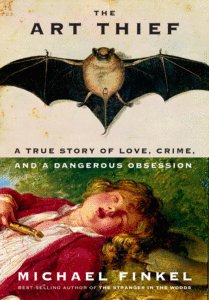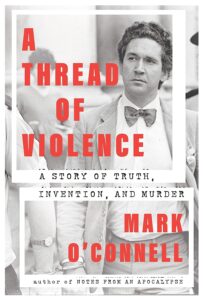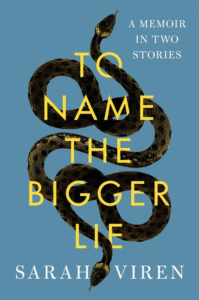
June’s Best Reviewed Nonfiction
Featuring new titles by Michael Finkel, Jennifer Ackerman, Sarah Viren, and More

Michael Finkel’s The Art Thief, Jennifer Ackerman’s What An Owl Knows, and Sarah Viren’s To Name the Bigger Lie all feature among the best reviewed nonfiction titles of the month.
Brought to you by Book Marks, Lit Hub’s “Rotten Tomatoes for books.”
*
1. The Art Thief: A True Story of Love, Crime, and a Dangerous Obsession by Michael Finkel
(Knopf)
8 Rave • 2 Positive • 1 Pan
Read an essay by Michael Finkel here
“Thrilling … This ultra-lucrative, odds-defying crime streak is wonderfully narrated by Finkel, in a tale whose trajectory is less rise and fall than crazy and crazier. Only briefly does his book lag, in its discussions of the alleged science of our attraction to art … Over all, The Art Thief, like its title character, has confidence, élan, and a great sense of timing. It is propelled by suspense and surprises, and it is neither ashamed of nor stingy with the fundamental emotional payoffs of the heist—the disbelieving No way!, the unabashed glee at the deft accomplishment of the seemingly impossible and definitely illegal. Nor does it hesitate, when the time comes, to bring down the boom.”
–Kathryn Schultz (The New Yorker)
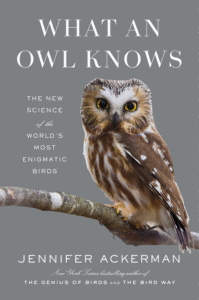
2. What An Owl Knows: The New Science of the World’s Most Enigmatic Birds by Jennifer Ackerman
(Penguin Press)
8 Rave
Read an excerpt from What An Owl Knows here
“Ackerman is a warm and companionable guide, so enthusiastic about her subject that I suspect even the avian-indifferent will be charmed by her encounters with owls and the dedicated people who study them. Each species seems like a marvel, but certain owls are so special that her book is peppered with superlatives … The photos in Ackerman’s book are fascinating”
–Jennifer Szalai (The New York Times)
=3. A Thread of Violence: A Story of Truth, Invention, and Murder by Mark O’Connell
(Doubleday)
6 Rave • 2 Positive
Read an excerpt from A Thread of Violence here
“Doubt is the dominant key of Mark O’Connell’s exhilarating A Thread of Violence, a probing portrait of one of the most notorious murderers in recent Irish history … O’Connell periodically interrupts his narration with what he calls ‘meta ruminations’ on such matters as truth and doubt. Eschewing the novelistic conventions of so many true-crime accounts, with their shifting points of view and you-were-there immediacy, he adopts instead the skeptical tone of the essayist … As O’Connell concedes in this brilliant and rigorously honest book, Macarthur ‘had failed me as a character. He had denied me the satisfaction of an ending.’”
–Christopher Benfey (The New York Times Book Review)
=3. To Name the Bigger Lie: A Memoir in Two Stories by Sarah Viren
(Scribner)
6 Rave • 2 Positive
Read a craft essay by Sarah Viren here
“Strange and wonderful … The book is preoccupied with twinned phenomena and dual perspectives. It’s a book for our times, when singular truths seem less certain with each passing day … She seems to be saying that creating art is as much meaning as we can hope for in this world. This might sound self-congratulatory, but it struck me as the ideal ending for this ouroboros of a book.”
–Claire Dederer (The New York Times Book Review)
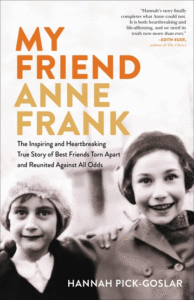
5. My Friend Anne Frank: The Inspiring and Heartbreaking True Story of Best Friends Torn Apart and Reunited Against All Odds by Hannah Pick-Goslar
(Little, Brown Spark)
5 Rave • 2 Positive
“Beyond this account of their tragically curtailed friendship and their brief, painful reunion, My Friend Anne Frank, written with Dina Kraft, is as much Hannah’s story as it is Anne Frank’s … Pick-Goslar certainly has a story, and she tells it here with great clarity and conviction. In many ways her experience parallels Anne Frank’s … Much of Pick-Goslar’s account may seem familiar to those who have read widely about Frank. So, I suppose the question arises: Do we really need another Anne Frank book? To which I would offer an unequivocal yes … She has a story, a piece of history, and she tells it straightforwardly and well. She describes, touchingly, and as very people few could, what it was like to read Anne’s diary after having known its author.”
–Francine Prose (The Washington Post)
Book Marks
Visit Book Marks, Lit Hub's home for book reviews, at https://bookmarks.reviews/ or on social media at @bookmarksreads.









